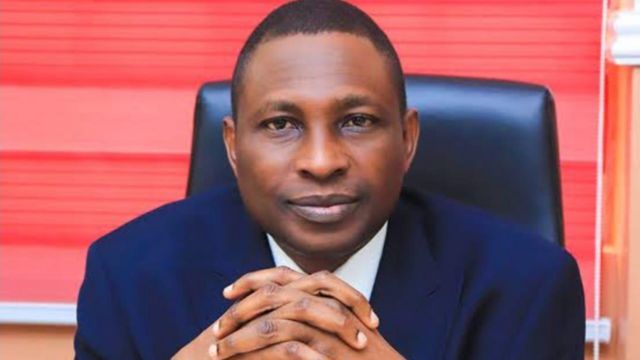The government of President Bola Tinubu addressed on Thursday evening about the controversy surrounding the selection of Ola Olukoyede as the new chairman of the Economic and Financial Crimes Commission (EFCC).
Anaedoonline.ng previously revealed that President Tinubu nominated Olukoyede as the head of the anti-graft agency to replace suspended chairman Abdulrasheed Bawa.
The news was announced on Thursday by presidential spokesperson Ajuri Ngelale in a statement.
Tinubu Appoints Olukoyede As EFCC Chairman After Bawa Resigned
Following the announcement, numerous Nigerians claimed that Olukoyede was unqualified for the position since he did not match the legal requirements.
The requirement in the argument is Section 2(3) of the EFCC Act, 2005, which stipulates that a chairman of the commission “must be a serving or retired member of any government security or law enforcement agency not below the rank of Assistant Commissioner of Police or equivalent; possess not less than 15 years experience.”
In response to the criticism, the senior special assistant to the president on public engagement, Fredrick Nwabufo, listed eight reasons why Olukoyede deserved to lead the EFCC.
Nwabufo stated in a post on X that Tinubu authorised the appointment in accordance with Section 2(3) of the EFCC (Establishment) Act, 2004.
Five Things You Should Know About New EFCC Boss, Ola Olukoyede
Nwabufo stated the following reasons:
“1. Mr Olukoyede was the Chief of Staff to the Executive Chairman of the EFCC (2016-2018) and Secretary to the Commission(2018-2020). He was a member of a law enforcement organisation as Secretary, in this case, the EFCC, as stipulated in the EFCC Act, and as such satisfied every legal detail to be appointed as Chairman.
“2. Section 2(1)(p) of the EFCC Act plainly, ordinarily, and unambiguously established the Secretary to the Commission (i.e., EFCC) as its member and head of its administration.
“3. The Supreme Court determined in the case of Ejuetami v. Olaiya & Anor (2001) LPELR-1072 (SC) at Pg.23-24, that: The words used are to be given their ‘ordinary and natural sense’. Therefore the clear, explicit and unambiguous words used in sections 2(1)(a)(i)-(iii), (p), 2(2), 3(1)-(3) and 8(5) of the EFCC Act must be given their ordinary and natural sense in line with the guidelines set by the Supreme Court in its long line of undisturbed judicial precedents.
Senate To Hold National Public Hearing On Constitution Review
“4. The provision of Section 2(1) sub-paragraph (iii) of the EFCC Act did not state the nature of the experience which a person is required to possess its similar or alike for fifteen (15) years. This implies that such cognate experience is presumed to be that of the work or functions of the EFCC acquired anywhere since the EFCC Act did not state the specific place where it must be acquired. It is also unambiguous by the provisions of subparagraph (iii) that once a person possessed fifteen (15) years of such cognate (i.e., similar or alike) experience, then he has satisfied the provisions of subparagraph (iii) of section 2(1)(a) of the EFCC Act.
5. It is clear from the unambiguous provisions of the EFCC Establishment Act, 2004, that any member of the Commission whether serving or retired who has 15 years’ cognate experience in their chosen career is eligible to be appointed as the Chairman of the Commission.
“6. Prior to this time, the convention and precedence, is that to be qualified for appointment as the Executive Chairman of the Commission, the nominee must be a Police Officer or someone with a law enforcement background, particularly in the area of investigation. This has not only exposed the Commission to all manner of vices but has brewed internal wrangling, discontent, and hatred among the members of staff of the Commission.
UPDATE: Tinubu To Appoint Former Secretary As EFCC Chairman
“7. It is nonjusticiable to elevate convention above statutory provision. It is time to move away from fiction to fact and from convention to strict adherence to the statutory provisions of the enabling Act of the Commission in our constitutional democracy.
“8. Mr Olukoyede satisfied every legal requirement to be appointed as EFCC Chairman.”
Follow us on Facebook
Post Disclaimer
The opinions, beliefs and viewpoints expressed by the author and forum participants on this website do not necessarily reflect the opinions, beliefs and viewpoints of Anaedo Online or official policies of the Anaedo Online.

